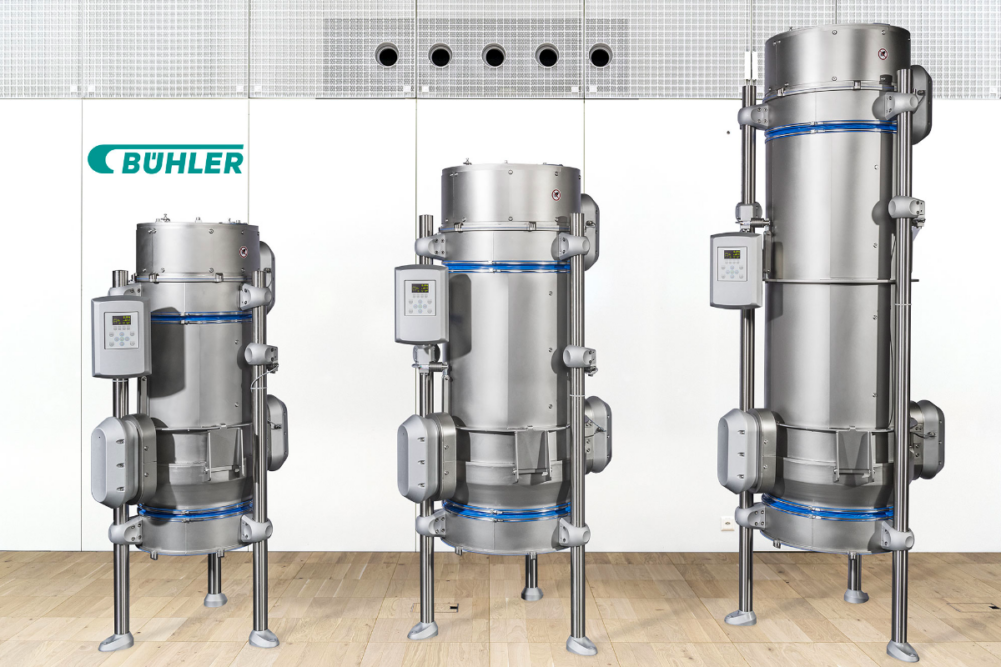UZWIL, SWITZERLAND — The family-owned Otto Crienitz Mill in Thuringia, Germany, recently added Bühler’s Tubex Pro scales as a step toward the digitization of production processes.
The business has grown fast and extended its customer base, two thirds of which are larger industrial customers and one third smaller artisan bakeries.
“It is very important to us as a business to maintain a close relationship with our customers and understand their needs,” said Felix Scharf, plant manager and member of the family that owns the mill. “We are a very lean business, fast and flexible. We provide excellent quality at competitive prices.”
The data provided by the system is extremely accurate, allowing for precise control over the production process and optimized profitability.
The old pneumatic scales at the Otto Crienitz Mill were operated with pressurized air to move the scales’ cylinders.
“We use pressurized air in many ways, it’s common practice,” Mr. Scharf said. “But this practice is costly. By avoiding pressurized air, we save a lot of energy, both in comparison to the machinery we used before and in terms of what we see from the competition.”
Bühler has completely eliminated the compressed air dependency by introducing energy efficient servo drives with Tubex Pro. These feature supercapacitors that collect and reuse part of the energy, reducing consumption by more than 90% when compared with pneumatic drives. This means annual savings of up to $5,000 per scale.
The new scales use high-grade stainless steel and food-approved materials. The lean system design minimizes the amount of deposits and reduces maintenance efforts and downtime. By avoiding small mechanical parts, such as screws, getting into contact with the produce, the risk of contamination is eliminated. At the Otto Crienitz Mill product changeovers are less of an issue. But the system is designed to facilitate changeovers with minimal downtime.
Reliability is also a key factor.
“We have had the Tubex Pro scales in operation for three months and they are still in perfect condition,” Mr. Scharf said. “Achieving maintenance cycles of three months is a good result.”
Six Tubex Pro scales are in operation at the mill, one for input and five for output. Their precise load cells work in conjunction with intelligent algorithms providing accurate measurements on each cycle. The scales are already set up to connect to Bühler Insights, a cloud-based platform that includes a growing portfolio of digital services. Through Bühler Insights, process data like real-time tracking of the scale condition, current and historic throughputs, alarms, warnings, recipes and jobs, is transformed into reports to aid decision-making.
The Yield Management System (YMS), one of the digital services available on Bühler Insights, combines the data captured by input and output scales, and measures not only the overall yield but also the yields at subprocess levels, giving the customer the information needed to fine tune the operation.
Mr. Scharf looks forward to moving operations to the next level.
“We are about to start a test phase with Bühler Insights,” he said. “This is an interesting project requiring input from both sides to train the system for best results. But the most important factor for us is the trustful collaboration. We are actively involved in the setup, so our specific requirements are considered. We set targets together with the Bühler team and share our knowledge and findings. Our common goal is to improve the end-product — that’s what matters.”
As Otto Crienitz moves toward the next generation of mill, increasingly the system can be operated remotely. This has many benefits.
“Our staff appreciate flexible working time,” Mr. Scharf said. “No one needs to be at the mill when there is nothing to do. This is valuable time that can be spent with the family at home. With operation data accessible via handheld devices you can access all the information you need remotely and at any time: I simply carry the mill in my back pocket.”
Increasing automation also provides many benefits, helping to maintain quality standards, reduce cost and facilitate cumbersome and error-prone processes so that trained staff can concentrate on working where they are really needed. Mr. Scharf’s view is clear.
“A miller’s job is to control the overall quality and processes,” he said. “All processes that can be performed by machines should be performed by machines. And with fewer young people training to enter this industry, we have to deploy staff in the best and most efficient way.”
For Mr. Scharf, sustainability is a matter of common sense.
“It makes sense to plan transport efficiently, to avoid waste and use resources carefully,” he said. This approach holds true: the team at Otto Crienitz plans deliveries carefully. As a business focused on local markets, routes do not exceed a 200-kilometre radius.
Over the past two years the Otto Crienitz Mill has worked with Bühler on several successful projects.
“After visiting the mill, Bühler consultants provided us with a complete assessment of the entire plant and made excellent suggestions for optimization that required no investment at all,” Mr. Scharf said. “That really convinced me that we were in good hands.”
For the future, Mr. Scharf is convinced that concentration trends within the industry will continue. Specialization also will play an important role over the coming years.
Otto Crienitz intends to keep up with the pace. This is only achievable with commitment and the best technology in place. The strong partnership with Bühler will help the mill move ahead towards a milling operation 4.0.
“As long as we keep looking for the best solution, we will always find our place in the market,” Mr. Scharf said.






